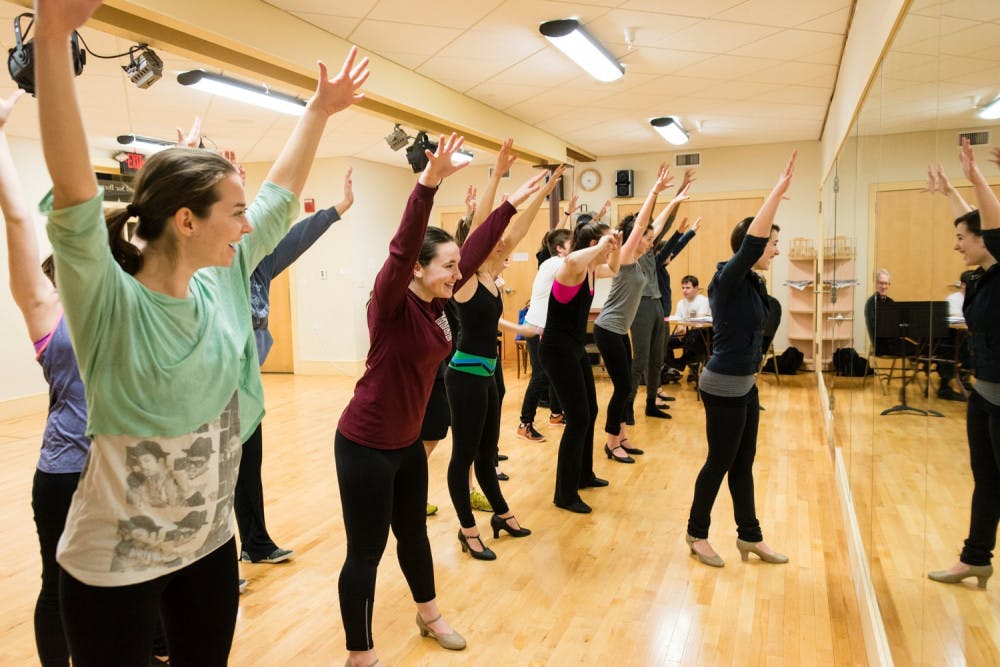On Thursday, Jan. 28, the curtain will rise on this year’s J-term musical, Chicago. A sizeable group of dedicated and talented Middlebury students have worked tirelessly on the project, preparing the production in a mere four weeks. The show is directed by the Middlebury Town Hall Theater’s executive director, Doug Anderson. College Affiliate Artist and voice teacher Carol Christensen is the music director for the show, and Alicia Vancho will be the primary choreographer. In addition to already sold-out shows on Jan. 28, 29, 31 and Feb. 1, the show’s final dress rehearsal will be open to the public on Wednesday, Jan. 27 at 8 p.m. for a $10 donation.
Chicago is an iconic and memorable work in the world of musical theater. Holding the record as the longest-running American musical in Broadway history, it tells the story of two rival vaudevillian murderesses, Velma and Roxie. The two women, imprisoned for their crimes, compete for the limelight of the sensationalizing press of the time. As New Line Theater’s Scott Miller outlines in his essay Inside Chicago, this musical is a “scathing satire of how show business and the media make celebrities out of criminals.” Overflowing with raw sexuality, Chicago is renowned for its impressive dance numbers and biting social commentary.
Director Doug Anderson emphasized the importance of the Town Hall Theater performance space for Middlebury’s production of Chicago.
“The College joined with the Middlebury community to purchase [a] dilapidated building in 2000, and was instrumental in helping to raise the $5 million needed for the restoration,” Anderson said. J-Term musicals like Chicago, he added, “[exemplify] the thought that the new venue would be a home for college events, a kind of cross-over space in which students and the larger community would interact.”
The first performance of Chicago was put on when the space was still a construction site, providing what Anderson called “an appropriately seedy setting for this seedy musical.” The original show set the stage for the J-term musicals of today, “send[ing] a strong message that this building could become a vibrant force in the cultural life of the community.”
Paige Guarino ’18.5, a member of the ensemble, described the audition process for the show as fairly standard. Students auditioning for any role had to learn a song for the first audition, before partaking in a large dance audition. Afterward, separate lead role and ensemble callbacks took place.
Guarino reiterated the importance of dance for this particular show, calling it “the main communication medium throughout the show.”
The cast for the J-term musical tends to be comprised mainly of first-years and sophomores, as most juniors study abroad and seniors are often busy working on a thesis during their final J-term. Anderson noted that a younger cast is “a big part of the show’s charm.”
This year, most of the tech crew and designers are composed of adults from the area and college alumni. The band is part student, part hired professionals, whilst the crew includes students from both the College and the local high school. The cast is made up entirely of Middlebury students.
Stage manager Alex Williamson ’17 highlighted some of the stand-out elements of the set, such as the gargantuan red “Chicago” sign that often serves as a symbol of this iconic musical.
“Another cool element of the set is that we have a second level of scaffolding that will be utilized in many parts of the show, specifically as jail cells for the ‘Cell Block Tango’ number,” Williamson said.
Winter term musicals require an immense amount of work and effort in a very short amount of time, and Chicago is no exception. Though the cast learns the music ahead of time during the fall semester, they only have two and a half weeks to put together all of the stage directions, choreography and technical elements.
“The only way we get it done is to approach the work with complete professionalism,” Anderson explained. “The challenge for the students is to basically convert themselves into a professional company, with two-a-day rehearsals and a complete commitment to the work.”
Guarino summed up this powerful, multilayered show effectively, stating: “There’s a lot of dancing, a lot of singing, a lot of popping and wow [factor] … but beneath that bigness is a very poignant message. Chicago is an incredible show that does a great job of balancing spectacle and meaning.”
Iconic Chicago Musical to Debut in Town

Comments



